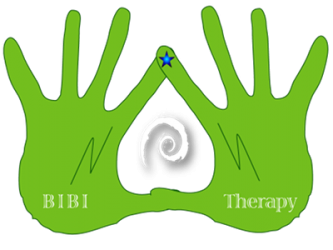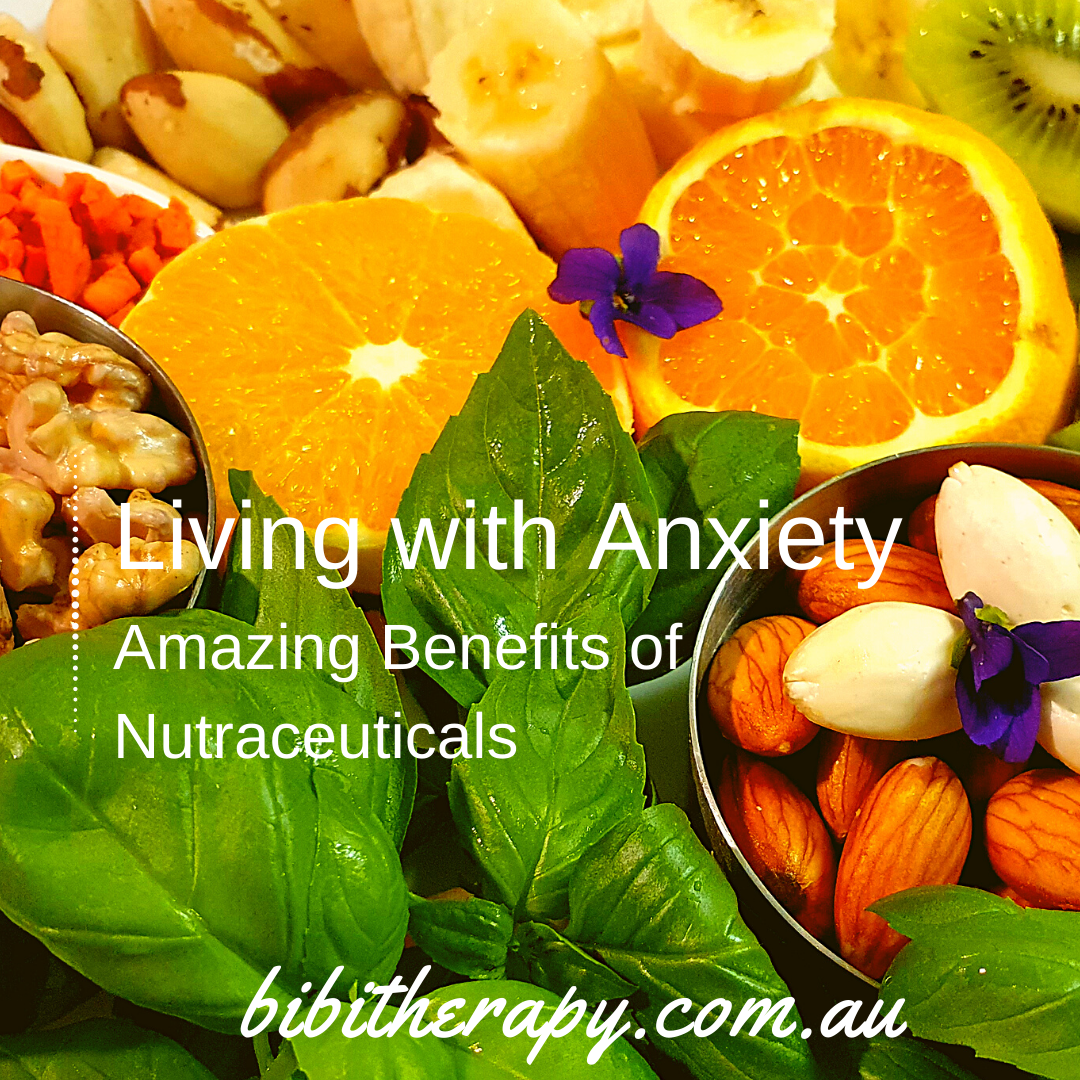As we are all well aware, the COVID-19 pandemic is still rife in Victoria. As a result anxiety levels heightened. If you are anxious about it, you are not alone. I feel anxious about many things. We are facing an unprecedented crisis at planetary level. I am worried about how does the Coronavirus affects our health in all its aspects physically, emotionally and spiritually. The most important thing is that I am living with it and I am taking proactive steps towards dealing with it. I am taking steps towards a healthy life-style and I use multiple Nutraceuticals as mood boosters. So can YOU!
This blog is about how Nutraceuticals can help and why. Enjoy!
First what are Nutraceuticals? Nutraceuticals are biological active compounds found in food that are beneficial for our health due to their known pharmacological action (Rajasekaran 2017). Nutraceuticals are compounds derived from foods with anxiety lowering and mood enhancing actions. They can often be found in the form of supplements and are available commercially. My interest is in the foods that provide them rather than the pills available at the pharmacy. My big pharmacy is Nature’s Nutrition. After all, Hipocrates considered nutrition one of the main tools to improve health. Some attribute this saying to him: “Let Food Be Thy Medicine”.
- Kiwifruits
The brain is extremely sensitive to oxidative stress (Cobley et al, 2018). This is a process in which the body produces an unstable molecule, called free radical, when oxygen reacts with organic compounds (sugar, alcohol, food additives, anti-foaming, flavours) or is exposed to environmental stressors (UV, ionising radiation, pollutants). The unstable free radical wanting to become stable, steals an electron from other more stable molecules nearby. This causes a harmful chain reaction can be terminated by super-stable molecules called antioxidants.
Kiwifruit is such an amazing fruit boasting rich levels of nutrients: antioxidants, flavonoids, carotenoids, anthocyanins, folate, and melatonin. Kiwifruit are remarkably high in Vitamin C with exceptional digestive benefits, due to its harmonious composition of various bioactive components (dietary fibre, potassium, vitamin E and folate, antioxidants, phytonutrients and enzymes).
Vitamin C prevents the oxidative stress processes in our body and in particular helps as antioxidant defence and as a neuromodulator in the brain. Only two medium kiwi fruits would provide 140% of daily intake of vitamin C and lead to increased vitality, less fatigue and improved mood feelings and vigour a 2013 study found (Car, et al). Furthermore, a 2017 Cochrane study on the use of Kiwi fruit established that it can work effectively in combating chronic insomnia symptoms without the unpleasant side effects of allopathic drugs.
Caution: Vitamin C is one of those vitamins that have a controversial history. Here is why: We tend to believe that the larger quantities we gulp in the better, stronger more positive effects we enjoy. It turns out overdosing (more than 3000mg a day), Vitamin C that switches roles from friend to foe.
- Oranges
Oranges are the source of optimism due to their colour, their smell and vitamin C. Only a ¾ of a cup and your Vitamin C content is up to good levels and there need no more explanation. But, this is not the reason I chose it. It turns out that just smelling their fragrance helps reduce stress levels and decrease anxiety (Lehrner et al, 2000). You don’t need to drink the juice just have an orange spritzing the room and enjoy the calmness that comes to it. And … remember next time you pay a visit to your dentist for an extraction take you orange with you. Just in case…
- Basil
Basil is one of those staple foods that we just sprinkle here and there for their fragrance. It helps promote cardiovascular health by relaxing the muscles cells and blood vessels. In particular Holy Basil (Ocimum sanctum) also known as “Tulsi” is considered the most sacred plant in India. Tulsi is a known adaptogen that helps decrease the stress hormones in the body. Adaptogens are a select group of plants that enhance the body’s natural protective response outside stressors, in the case of the holy basil emotional or physical stress. That is to say that adaptogens do not alter the mood itself, rather help the body coping better in a stressful situation.
I like using it in smoothies and to flavour certain foods.
- Nuts
Brazil Nuts. Despite their name, they are not nuts but rather seeds of a vulnerable but longest lived tree in the Amazon forest: Bertholletia excelsa. They are an excellent source of Selenium. Selenium is a power antioxidant able to reduce stress due to its capacity to neutralise excess free radicals (Brenneisen et al 2005) similarly as vitamin C. However one needs significantly less selenium to do so less than 100 micrograms a day. That means one would eat only one Brazil nuts a day.
Snack on walnuts and almonds. They are packed with beneficial fats that are known to support brain function. In particular, walnuts provide a specific fat known alpha linolenic acid (Holly et al 2018) known to improve learning. A small amount of only 15 g of walnuts a week may do wonder if actively learning new things according to a 2018 study (Holly et al, 2018). Almonds are the best source of natural vitamin E. A handful of almonds will provide 50% of the daily vitamin E requirement: around 7mg.
- Sweet Violets – Viola Odorata
Ever wondered why do you like the violets fragrance? The aroma compounds, termed ionones, in the violets mess-up with our sense of smell. One moment we think we got their sweet scent in, the next we can’t smell a thing. The ionones desensitise our olfactory system: the scent disappears for a short while as the ionones bind and shut off the scent receptors so we can’t smell the violets for a short time. After taking a breath the smell reappears. Josephine, Napoleon’s first wife, used this charming trick to make herself more fascinating.
But behind the trick, hides a medicine giant. As a nutraceutical, Persian Pharmacopeia shows its use in the form of sugar-coated flowers called Gulqand (Afsari Sardari et al 2018). It is used to combat fever and coughing in lung related disorders (pleurisy, pneumonia). Sweet violets have a slight mucilaginous quality (Ameri et al, 2015), that is extremely soothing and cooling to mucous membranes.
The reason I mention it here is due to its ability to combat chronic insomnia (Feyzabadi et al 2014). Although, in this research the plant was not used as a nutraceutical, rather the fragrant compounds from dried Violets was extracted in almond oil then used as intranasal drops. The participants were suffering from chronic insomnia in its various forms: difficulty initiating or maintaining sleep without suffering from any other major disorders (including major depression, generalized anxiety disorders, psychosis, drugs abuse, neurologic diseases). The treatment, involving the violet oil, consisted in taking intranasal drops nightly before going to sleep for a month. The sedative activities were assessed as very favourable despite the small batch of participants.
I admit that as a scientist, this is a reasonable beginning. I would rather consider the nutraceutical properties of this plant for its plant-derived melatonin bioactivity (Ansari et al 2010).
How to take it
- Eat the flowers raw, pluck them from your garden if you happen t accidentally grow them; do not overindulge;
- Sprinkle flowers on salads, smoothies, etc
- Make a tea from fresh or dried flowers. The colour of the tea is blue. It turns purple if add a few drops of lemon juice. Something nice to try.
Summary of what to do to keep anxiety level under control with Nutraceuticals:
- Two kiwifruit per day: benefit of vitamin C;
- ¾ cup freshly squeezed orange juice: benefit of vitamin C plus orange fragrance;
- Have some leafy green salads: benefit of magnesium;
- Eat a banana before or when facing a stressful situation: benefit beta-blocker effect;
- Eat only one Brazil nut: benefit of selenium;
- Eat a handful of Almonds: benefit vitamin E;
- Eat a few sweet violets: benefit helps improve sleep;
- Eat 15 g walnuts a week: benefits alpha linolenic acid.
What Should you Know before Using Nutraceuticals as Mood Enhancer?
Always speak with your doctor before deciding to try a Nutraceutical. These foods may interact with other medications and may cause side effects that could adversely influence your health.
This blog is for information only. Do your diligent homework, talk to your doctor and enjoy a natural mood enhancer — and potentially greater well-being.
Resources
Ameri, A., Heydarirad, G., Jamileh Mahdavi Jafari, J.M., Ghobadi, A., Hossein Rezaeizadeh, H. & Choopani, R. (2015). Medicinal Plants Contain Mucilage Used in Traditional Persian Medicine (TPM), Pharmaceutical Biology, 53(4), 615-623, https://doi.org/10.3109/13880209.2014.928330
Afsari Sardari, F., Azadi, A., Mohagheghzadeh, A., & Badr, P. (2018). Gulqand: A Nutraceutical from Sugared Petals. Traditional and Integrative Medicine, 3(4), 180-185. Retrieved from https://jtim.tums.ac.ir/index.php/jtim/article/view/164
Ansari, M., Rafiee, K. h., Yasa, N., Vardasbi, S., Naimi, S. M., & Nowrouzi, A. (2010). Measurement of melatonin in alcoholic and hot water extracts of Tanacetum parthenium, Tripleurospermum disciforme and Viola odorata. Daru : Journal of Faculty of Pharmacy, Tehran University of Medical Sciences, 18(3), 173–178. https://pubmed.ncbi.nlm.nih.gov/22615614/
Brenneisen, P., Steinbrenner, H., & Sies, H. (2005). Selenium, oxidative stress, and health aspects. Molecular aspects of medicine, 26(4-5), 256–267. https://doi.org/10.1016/j.mam.2005.07.004
Carr, A. C., Bozonet, S. M., Pullar, J. M., & Vissers, M. C. (2013). Mood improvement in young adult males following supplementation with gold kiwifruit, a high-vitamin C food. Journal of nutritional science, 2, e24. https://doi.org/10.1017/jns.2013.12
Cobley, J.N., Fiorello,M.L. Bailey, D.M. (2018). 13 Reasons why the Brain is Susceptible to Oxidative Stress, Redox Biology, 15 (490-503). https://doi.org/10.1016/j.redox.2018.01.008.
http://www.sciencedirect.com/science/article/pii/S2213231718300041
Feyzabadi, Z., Jafari, F., Kamali, S. H., Ashayeri, H., Badiee Aval, S., Esfahani, M. M., & Sadeghpour, O. (2014). Efficacy of Viola odorata in Treatment of Chronic Insomnia. Iranian Red Crescent medical journal, 16(12), e17511. https://doi.org/10.5812/ircmj.17511
Holly C. Miller, Dieter Struyf, Pascale Baptist, Boushra Dalile, Lukas Van Oudenhove, Ilse Van Diest. (2018). A mind cleared by walnut oil: The effects of polyunsaturated and saturated fat on extinction learning, Appetite. 126:147-155. https://doi.org/10.1016/j.appet.2018.04.004.
J Lehrner, J., Christine Eckersberger, C., Walla, P., Pötsch, G. & Deecke, L. (2000). Ambient odor of orange in a dental office reduces anxiety and improves mood in female patients. Physiology & Behavior, 71: 1–2 ( 83-86). https://doi.org/10.1016/S0031-9384(00)00308-5
Nodtvedt, O.O., Hansen, A.L., Bjorvatn, B., Pallesen, S. (2017). The Effects of Kiwi Fruit Consumption in Students with Chronic Insomnia Symptoms: A Randomized Controlled Trial. Sleep and Biological Rhythms, 15(2), 159‐166. https://www.cochranelibrary.com/central/doi/10.1002/central/CN-01365601/
Poljšak, B., Ionescu, J.G. (2009). Pro-Oxidant vs. Antioxidant Effects of Vitamin C. in Kucharski, H and Zajac, J (Eds.), Handbook of Vitamin C Research: Daily Requirements, Dietary Sources and Adverse Effects (pp. 153-183). Nova Science Publishers, Inc.
Rajasekaran, A. (2017). Nutraceuticals. S. Chackalamannil, D. Rotella, S. E. Ward (Eds.), Comprehensive Medicinal Chemistry III (pp. 107-134). Elsevier. https://doi.org/10.1016/B978-0-12-409547-2.12287-5. (http://www.sciencedirect.com/science/article/pii/B9780124095472122875)

